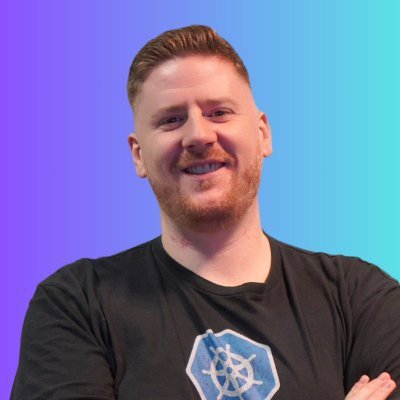

David Flanagan
Helping Developers, Platform Engineers, and Infrastructure Operators Level Up with Kubernetes.
Glasgow, United Kingdom
Actions
Founder of the Rawkode Academy, open source contributor, and beloved husband and father to my wife, two amazing kids, and a plethora of animals.
David has been developing software professionally for nearly 20 years, starting with embedded systems written in C back in 2004, and has spent that entire time learning the paradigms of different programming languages, including C++, PHP, Java, and Haskell - though more recently preferring to work with Go, Rust, and Pony.
As a professional technology magpie, David was an early adopter of cloud, containers, and cloud-native technologies. During his time as the Director of Development for a rock and metal media organization called TeamRock (now LouderSound), David was responsible for the software, infrastructure, and website during its biggest test: the unfortunate death of Lemmy Kilmister. Fortunately, due to his desire to experiment and play with new technologies, David and his team had already migrated their slow to provision virtual-machine centric infrastructure to containerised workloads running on Amazon Web Services the year prior, 2014, not long after the public launch of Docker.
As much as David enjoys writing software, scaling infrastructure, and leading teams, he quickly realised that his passion was helping others learn and be successful. David started presenting at local user groups in 2016, slowly working up to conferences, before eventually moving into a full-time Developer Advocacy position at InfluxData - where he presented and taught workshops at 42 events in 2019.
Outside of technology, David enjoys reading science fiction, drinking craft beer and whisky, and very-very-very slowly learning to play the piano.
Area of Expertise
Topics
Klustered: Debugging Kubernetes Live
What do you do when your Kubernetes cluster stops working?
As more teams and organizations adopt Kubernetes, more developers and operators are taking on the responsibility of keeping their clusters happy and healthy. While there's lots of information online for getting started and extending Kubernetes, there's not a lot that focuses on debugging and handling outages; enter Klustered.
In this session, I will live debug some clusters broken by members of the Kubernetes community; showing the methods and techniques to establish which component has a problem, how to determine the root cause, and apply a fix to get the cluster operational.
Kubernetes for JS/TS Developers
Kubernetes, the flagship project from the Cloud Native Foundation, has become the de-facto standard for running container based workloads.
Unfortunately, Kubernetes is a fast-moving, ever-evolving, sea of complexity. From Pods to Deployments, ConfigMaps to Secrets, and PersistantVolumeClaims to StatefulSets; this session will get you on-course and teach you everything you need to know to take your container based application and deploy it as a self-healing, redundant and resilient application on top of Kubernetes.
Let's set sail.
What I Learnt Fixing 50+ Broken Kubernetes Clusters
Is your idea of fun sitting in front of a camera, live streaming to the internet, debugging and fixing a broken Kubernetes cluster? Doubtful.
What if these Kubernetes clusters were intentionally broken by members of the Kubernetes community, tasked with making your chances of fixing said clusters as slim as possible?
Join us today to learn the key methods, tools, and takeaways David has learnt fixing over 50 Kubernetes, live on his series: Klustered.
Platform Engineering in ANY Language
The days of bash being the language of the Ops professional are long gone. Today, we have the privilege to operate bare metal, provision the cloud, and sprinkle annotations on our Kubernetes manifests with a plethora of programming languages.
In this session, I will guide you through building a self-service platform in 4 different programming languages, using Pulumi with AWS, Azure, and GCP.
Would you do this in production? Maybe not. Will it be fun? You're damn right.
Deleting Rawkode from the Internet
I could call this session "Infrastructure as Code with TypeScript", but that wouldn't be very exciting. What would be exciting is me deleting every single one of my DNS records, for all my domains, live on stage.
So let's do that. For real life. This is not a drill.
In this session we'll explore infrastructure as code with TypeScript but with a more practical and applicable scenario that every developer has: managing DNS records.
As developers, some could say we're a little too quick to buy domains; but have you ever configured them, with code, to handle MX records, DKIM, SPF, DMARC, url shortening, and HTTPS redirects?
Doing this as code provides the ability to remediate from disaster within minutes.
I'll prove it ... join me for the happiest demo of my life ... or potentially the saddest.
Let's have some fun.
The Future of Serverless is WebAssembly: Serverless Measured in Nanoseconds
WebAssembly is reshaping and delivering a new wave of cloud computing.
WASI Preview 2 brings server-side applications to the forefront of serverless with a component model that provides networking, files, and more; paired with an invocation time that is measured in nanoseconds instead of milliseconds.
The growing support for WASM and WASI means we can write services in TypeScript, Rust, Go, Zig, and many more languages which can seamlessly inter-opt with each other over common APIs.
In this session, we'll explore the leading toolchains for building and shipping WASM + WASI stateful serverless functions to the edge.
Let's dive in.
NDC Oslo 2022 Sessionize Event
ContainerDays 2022 Sessionize Event
Devopsdays Amsterdam 2022 Sessionize Event
CDK Day 2022 Sessionize Event
DevOpsDays Birmingham (UK) 2022 Sessionize Event
NDC Oslo 2021 Sessionize Event
Please note that Sessionize is not responsible for the accuracy or validity of the data provided by speakers. If you suspect this profile to be fake or spam, please let us know.
Jump to top